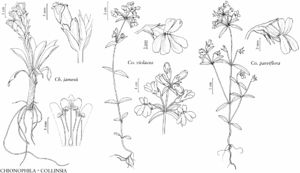Collinsia parviflora
Bot. Reg. 13: plate 1082. 1827.
Annuals 3–40 cm. Stems erect to ascending. Leaf blades ± linear-lanceolate, obovate, or narrowly elliptic, margins subentire. Inflorescences glabrous or sparsely and finely glandular; proximal nodes 1-flowered, distals 3–5(–7)-flowered; flowers not crowded proximally, sometimes crowded distally; distalmost bracts linear, 5–6 mm. Pedicels ascending to reflexed, longer than calyx, visible. Flowers: calyx lobes ± deltate, equal to capsule, ape× sharply acute to acuminate; corolla blue, banner whitish or blue-tipped, 4–8 mm, glabrous; banner length 0.8–1 times wings, lobe base without folds; banner lobes and wings blue, sometimes purplish, oblong, 1(–3) mm wide; throat barely angled to tube, tube and throat white, narrowed to lips, pouch angular, ± hidden by calyx; stamens: filaments glabrous, basal spur 0. Seeds (3 or)4, oblong, 2–2.5 mm, margins thickened, inrolled. 2n = 14, 28, 42.
Phenology: Flowering Mar–Jul.
Habitat: Forests, grasslands, meadows, eroded banks, bedrock depressions, scree slopes, shrublands, shaded shorelines.
Elevation: 0–3500 m.
Distribution
Alta., B.C., Man., N.S., Ont., Sask., Yukon, Alaska, Ariz., Calif., Colo., Idaho, Mass., Mich., Mont., Nebr., Nev., N.Mex., N.Dak., Oreg., Pa., S.Dak., Utah, Vt., Wash., Wyo.
Discussion
Collinsia parviflora is the closest relative of C. grandiflora and is primarily a plant of moist montane habitats with well-drained, rocky or sandy soil. However, it occurs in a wide range of habitats across its entire range. The species is also the most widespread taxon within Collinsia. Some plants from the western coastal ranges may be difficult to separate from C. grandiflora.
Collinsia parviflora is frequently confused with C. wrightii. The corollas of C. wrightii are distinctly purplish; those of C. parviflora are bright blue. The acute to acuminate sepals of C. parviflora contrast with the blunt, rounded tips of sepals of C. wrightii.
Selected References
None.
